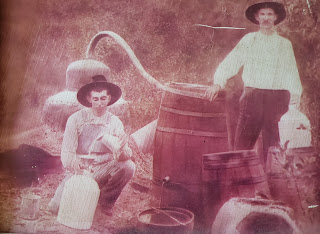Moonshine, Murder and Mayhem
My ancestors came to the hills of north Georgia in 1782 and
built a log cabin on a flat piece of ground in a cedar grove which, by the time
I was growing up, had long since been replaced by a chicken coop. They were a rough lot, having migrated from
Scotland to the mountains of Virginia/North Carolina almost a century earlier
as outlaws fleeing some kind of political persecution—or at least that’s the
story the family tells. I’m not at all
sure about the political part, but outlaws—yeah, I can see that.
The bedtime stories of my childhood were not necessarily
fairy tales. Southerners have a notoriously celebratory relationship with the
macabre, and one of my earliest memories is the tale of a Creek ancestor of
mine who had the temerity to marry into our family. Apparently, he was not
widely embraced as an in-law. He was
found one morning floating face-down in a creek that bounded our property, “his
long white hair streaming out behind him”.
The law ruled it suicide, but was it?
My great-grandfather shot and killed his neighbor in a
dispute about cows one morning while walking to work. His nine year old son, my grandfather, was
with him at the time and was later called to give testimony in court. For as long as I knew him, my grandfather was
terrified of going to the courthouse, even for something as innocuous as
getting his driver’s license.
That same grandfather had a mysterious relationship with
alcohol, the stories about which went even deeper underground when he married a
Baptist (think: Grandpa Walton from The
Waltons). The mystery became
slightly more comprehensible when, as teenagers, my brother and I visited a historical
display about early Appalachian life with our parents and my father
demonstrated a far more intimate knowledge of the workings of a moonshine still
than the historian who was giving the lecture.
Evidence eventually led us to believe that my dad—who was already right
out of Central Casting with his 1950s James Dean good looks—ran moonshine for a
living before meeting and marrying my mom who was, unfortunately for him,
another Baptist.
Readers will recognize the stories of my two ancestors—one
dead in a creek and another accused of murdering a man over a cow—as elements
from Murder Creek (Raine Stockton Dog Mystery #14).
For these and other reasons, people often ask me if my character, Raine
Stockton, is based on myself. I always
answer No, because—except for our love of dogs-- we are so different in every
possible way. I cower in a corner when I hear a nail gun fire, much less a hand
gun. She runs in to save the day; I lock the doors, hide under bed and dial
911. Whereas Raine is always asking “Who?
Where? How? Why? ” my tendency is to shrug and figure someone else will take
care of it.
Of course most of this is simply the difference between a
fictional sleuth and a real-life writer.
Given the legacy of my ancestors, I had no choice but to become a
mystery writer, and every part of Raine Stockton carries a little bit of my
DNA. The house she lives in is actually
the farm house my family built overlooking the cedar grove—and the chicken
coop-- in 1880. I still carry that faded photograph of them,
standing so proudly on their newly-built front porch, in my mind. The Feed & Seed where Raine buys dog food
is in reality only 3 miles from my current home, and I buy dog food there
too. The courthouse, which, as faithful
readers know, plays such a dramatic part in Raine’s life, is an exact replica
of the courthouse in the tiny north Georgia county where I grew up… and in
which my grandfather refused to set foot for years. I’d be lying if I said that certain characters—and
events!—were not based on memories of my youth.
God willing, they will never recognize themselves in any of my books.
Although the property on which my ancestors built that first
log cabin over two centuries ago has long since been covered in tract
homes, I feel no sense of loss. That place, and the pioneers who settled it,
will live forever in my imagination.
Their stories will continue to be told by Raine Stockton, and characters
like her, as long as I am able to give them voice. And, like all good stories, their telling
will only get better over time.





Comments